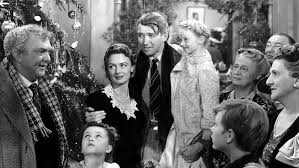It’s A Wonderful Life is 70 years old this December 20.
It’s a wonderful life. Radical statement? Or true? My feeling is that some people today have been used to a wonderful life, but then come the spanners in the works, such as disasters, terrorism and terrible weather. The wonderful life has gone to the dogs, but the old-time Christmas classic It’s a Wonderful Life (1946) is still apt even after all these years.
Former director Frank Capra, who directed It’s A Wonderful Life, may have seemed like an idealist who never dealt with reality. But if reality, by that equation, is meant to be wallowed in, then what’s the use anyway?
However, there is hope.
The suicidal character in It’s A Wonderful Life has come to his wits end. His despair is not because of an earthquake, an attack, or a storm. His despair is because he has been robbed of his self-worth and dignity because of a greedy man who took away from his livelihood. In 1946 that was the issue and for some of us it still is.
Self-worth at Christmas affects the lonely and homeless and other people that we may not expect.
It’s A Wonderful Life gives us a character who we wouldn’t expect to be down in the dumps. He’s outwardly successful, but harbors a secret that he won’t even tell his beloved family. They love him, but he’s wracked by self-doubt that almost kills him. Something happens. Something goes wrong to cause the problem.
Comes the angel from God
Frank Capra does not leave the audience with a destitute character who wallows incessantly. He shines a light on the problem. That’s the Christmassy aspect of this classic movie: the light to show the way.
Simply there being a problem is the indicator that something’s got to be done about it. Capra seems to see this and makes his problematic character face his ‘demons’. He puts an angel in his midst.
The angel helps the man see his life not as the person he has been. The angel shows the man the influence he wouldn’t have had had he been someone else. His presence in the world, on the other hand, has been life affirming.
Times like these that make people see that their lives are worth something, somehow. At Christmas this is especially relevant, when there are people thinking about their lives and wondering if it’s worth something. In It’s A Wonderful Life, Clarence the angel from God, shows life is worth living.
Capra’s appeal to the something good the suicidal character has done is better than being told “You’re worth it” or “You’re special”, some vague notion like that. Instead, an appeal is made to the character’s proven worth and this encourages him. Wise.


